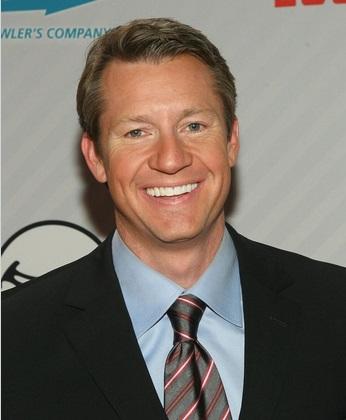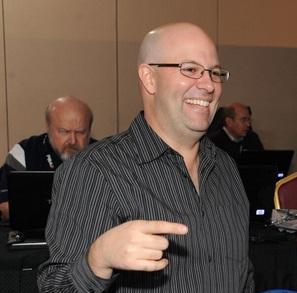Bowling With Weird Al: How America’s Greatest Pastime Influenced America’s Greatest Satirist

Throughout his career, now in its fourth decade, "Weird Al" Yankovic often has incorporated bowling into his music, videos and his cult-hit feature film, UHF.
BY JEF GOODGER
“I want to bowl with the gangstas.”
In his 2006 hit, “White & Nerdy,” while touting his Segway driving skills, delighting in his fashionable fanny-pack and gloating about doing vector calculus just for fun, there’s one thing “Weird Al” Yankovic really wants to do at the end of the song: “I want to bowl with the gangstas / But, oh well, it’s obvious I’m white and nerdy.”
It’s funny because it’s true. If there were one activity Yankovic would want to do with the gangstas, there’s a good chance it would be to bowl. He was rolling a bowling ball before he was squeezing an accordion. The latter eventually took precedence, but the former never left him, as we can see throughout his entire body of work.
Popular culture has always had an interest in bowling, even if it’s usually presented in a supporting role. Every sitcom, past or present, features the sport in at least one episode. The Big Lebowski, although not a bowling movie, highlights the game prominently as a backdrop. Television commercials purporting to sell a carefree attitude put smiling actors on the lanes to hawk anything from pharmaceuticals to digital cameras.
When confronted with a pop-culture phenomenon such as this, there is only one place to turn: “Weird Al” Yankovic, the biggest-selling comedy recording artist in history and undisputed king of pop culture who happens to have a sizeable affinity for bowling. Throughout his career, which is now in its fourth decade, Yankovic often has incorporated bowling into his music, videos and his cult-hit feature film, UHF.
 Yankovic says that however derisive his work’s many bowling references may seem, “Most of the things I lampoon are things I actually love.”
Yankovic says that however derisive his work’s many bowling references may seem, “Most of the things I lampoon are things I actually love.”
Coming off the immense success of 2014’s Mandatory Fun, the first comedy album to debut at #1 on the Billboard chart and the first in more than 50 years to even reach the top spot, Yankovic is marking the end of an era with Squeeze Box: The Complete Works of “Weird Al” Yankovic, a career-encompassing box set to be released by Legacy Recordings and PledgeMusic this November.
Naturally, I seize the opportunity of such a career-spanning milestone to talk to Yankovic specifically about his penchant for referencing bowling so often over the years. It’s no surprise that it’s no coincidence.
“Bowling was a big part of my childhood,” he says, “and as such, it informed my art.”
Born and raised in Lynwood, Calif., Yankovic fondly recalls plenty of childhood weekends spent on the lanes with his aunts and his grandmother.
“It was called ‘Blue Chip Bowling,’” he says. “If there was a colored pin as the headpin and you got a strike, you would win so many Blue Chip Stamps.”
Like a true bowler, the level of detail of his memory goes deeper. “And if you got it in the 3rd, 6th and 9th frames, you would win even more Blue Chip Stamps. At the time, it was a big deal to win Blue Chip Stamps from bowling.”
It was a big enough deal that, less than 20 miles away in Venice, eventual PBA Hall of Famer Randy Pedersen was doing the same thing.
“Blue Chip Stamps were as good as cash,” says Pedersen. “As a kid, you didn’t know what pressure was until you had to strike for a book of stamps.”
Yankovic is five years older than Pedersen, and — as best as we can tell — the two never ran into each other during those weekend sessions. However, they both used the experiences, in different ways and to varying degrees, to help rise to the pinnacles of their respective careers, Pedersen winning 13 PBA Tour titles and Yankovic winning four Grammy awards among 15 nominations.
“I was on a bowling league when I was 12 years old,” says Yankovic. “My junior-high friends and I. After school, we would have the bowling tournament. I have to say I was not a great bowler at all, but it featured prominently in my early life.”
In between trips to the lanes, Yankovic dedicated most of his time to reading MAD Magazine, learning to play the accordion his parents gifted him (he is not related to America’s Polka King, Frankie Yankovic), writing funny songs and sending tapes to Dr. Demento, who was the first person to play one of Yankovic’s recordings, the never-released “Belvedere Cruising,” on the radio. From that point on, Yankovic, despite having what looked to be a promising career as an architect ahead of him, was a musician.
His affection for bowling found its way into his lyrics, and his desire to play the game hasn’t waned even as his schedule gets busier performing around the world, appearing on TV shows and adding to his rapidly growing voiceover resumé, most recently supplying the voice for the title character in Disney XD’s Milo Murphy’s Law.
“Chris Hardwick invited me to be a part of his celebrity bowling Nerdist webcast,” says Yankovic. “It was the nerds versus the Mad Men. I did embarrassingly badly. And poor Jon Hamm; he’s already Jon Hamm, for crying out loud, and we find out he’s a great bowler, too.”
Yankovic, fully aware of Hardwick’s father Billy’s PBA Hall of Fame stature, jests, “He definitely has an unfair advantage on everybody. He’s an incredible bowler and he’s like, ‘Hey, let’s do a show where I’m better than everybody else.’”
Maybe I’ll Go Bowling
You can usually generalize a person’s age by asking what the first Weird Al song he or she heard was. Mine was “Smells Like Nirvana.” Furthermore, you can usually tell a person’s level of bowling immersion by whether or not he or she notices even the slightest reference to it in pop culture. My level is “preposterously high.”
In short, I’m primed for this conversation about Yankovic’s kinship with bowling. Thankfully, so is he.
In an effort to deftly straddle the line between a well-prepared journalist and a drooling fan, I begin listing a few of the times Yankovic has mentioned bowling in his oeuvre. I’m working toward the song I want to discuss most, but he gets there first.
“’Generic Blues,’” he says. “ featured very prominently in that song.”
The song, from 1989’s UHF: Original Motion Picture Soundtrack and Other Stuff, is an original composition in which Yankovic absurdly outlines the utter misery of life and contemplates ending it all, but comes to a very reasonable alternative: “Maybe I’ll go bowling instead.”
The song closes with a more elaborate, farcical intention, hitting several bowling stereotypes: “Or maybe I’ll go bowling / Or I just might go bowling / Maybe I’ll just rent some shoes and go bowling / Maybe I’ll join a league, enter a tournament, put on a stupid-looking shirt and go bowling instead / Yeah.”
 Yankovic and PBA Hall of Famer Randy Pedersen both indulged a game called “Blue Chip Bowling” as kids growing up in southern California.
Yankovic and PBA Hall of Famer Randy Pedersen both indulged a game called “Blue Chip Bowling” as kids growing up in southern California.
Aside from what bowlers would call a highly relatable correlation between self-loathing and bowling, we can read deeper into the lyrics than perhaps intended to find poignancy. No matter how bad life appears, we can always retreat to the lanes.
“Generic Blues,” intentionally or not, feasibly captures the essence of what bowling does to the human brain better than any drawn-out explication in the history of the sport.
On a literal level, it’s hilarious. Bowling as a solution? It makes sense to readers of this publication, but to general society, it is hysterical. That’s no mistake.
“Most of the things I lampoon and parody are things I actually love,” says Yankovic. “It comes from a real place. My humor is not mean-spirited, I’m not going for the jugular and not trying to step on anybody’s toes. I’m just trying to have a little bit of fun.”
Yankovic has been having fun professionally since his eponymous debut album in 1983, the first of 14 studio albums that, along with Medium Rarities, a not-yet-finalized (“The lawyers are still battling it out,” he says) collection of songs not previously released on albums, will be included on Squeeze Box.
“It’s not like it’s the end of my career,” he says, “but it’s the end of my album output, I think. It’s the end of my record deal, and anything I do from now on is probably not going to be released 12 songs at a time in an album format.”
Squeeze Box will be a literal squeeze box: a replica of Yankovic’s accordion, with the bellows housing all 15 albums presented in CD, 150-gram vinyl and digital formats, along with a 100-page book.
“It’s a cool thing,” he says of the overall package, which he points out was conceived and pitched to him by Legacy Recordings. “I think my fans will enjoy having a replica of my accordion as part of their record collection.
“Vinyl has made a dramatic comeback and this collection will see the first vinyl release of six of my albums. For the vinyl junkies and the hipsters and the audiophiles, that’s going to be a nice treat. Whatever format you want, Legacy’s got you covered.”
And, of course, for the bowlingphiles who are silently comparing the three album formats to the evolution of cover stocks, as I am, it’s the perfect time to review Yankovic’s predilection for including bowling so often in his lyrics. To name just a few instances, he found himself bowling on the Starship Enterprise in “Stuck in a Closet with Vanna White,” he played on the company bowling team in “The Weird Al Show Theme,” he included his bowling ball as one of a select few items necessary for a plane ride in “Albuquerque,” did a little bowling in “Bedrock Anthem,” said he was about as sharp as a bowling ball in “Genius in France” and compared the depths of his desolation to dropping a two-ton bowling ball on his toes in “Since You’ve Been Gone.”
This is nowhere near an exhaustive list. Fans of Yankovic know of his tendency to refer to certain things frequently, such as the number 27 or the name Bernie, but bowling has, even among his most devoted fans, remained underrated even in this sense. Not to Yankovic, though.
“It’s kind of one of those touchstones,” he says, putting it on the same level as his other refrains, “and every now and then I’ll make a reference to it.”
In the song and music video for “Living With a Hernia,” Yankovic describes the numerous difficulties he faces with his hernia, including how he “Can’t play tennis / and it’s hard to bowl.” In the video, we see one of the earliest examples of two-handed bowling. Yankovic, dressed as James Brown (bowling fans may see a little Ernie Schlegel in there as well), attempts to bowl with a hernia. If you haven’t seen it, you owe yourself a trip to YouTube.
When I mention this footage to him, it seems as if I’m reminding him of its existence for a moment before he laughs and fondly recalls that particular video shoot. I ask him to expound on the experience of directing and shooting his videos, and his insight sounds dangerously close to a game of bowling.
“It’s a lot of fun,” he begins, “but it’s not like a non-stop party, because especially when I’m directing, I have to be very focused. Sometimes, it’s hard to enjoy it at the time because I’m so focused on getting the job done. I don’t realize until later, ‘Oh yeah, that was really fun.’”
Fun is a recurring theme with Yankovic and typically the context into which he calls upon bowling. In his widely acclaimed live show, the audience is treated to non-stop entertainment from start to finish.
“I like to bombard people with fun,” he says. “The live shows have gotten bigger and better and more theatrical and we try to make it fairly relentless. There are a lot of costume changes, and to accommodate that, we also have film clips. If it takes us a minute and 27 seconds to get into costume, we make sure the film clip is only a couple seconds longer than that. We try to keep it moving quickly and make sure there’s never a dull moment on stage.”
Fun With Reverence
In Weird Al: The Book, author Nathan Rabin writes, “Children who bought Al’s albums for the hits risked accidentally picking up a broad-ranging musical education in artists, songs and styles they might never otherwise have been exposed to. If they weren’t careful, they just might learn something.”
Yankovic is best known for his parodies, like “Eat It,” “Fat,” “Amish Paradise,” “Tacky” and “Word Crimes,” to name several I haven’t already named, but approximately half his catalog consists of original songs. Of those, the majority are what Yankovic calls style parodies, or pastiches, in which he harnesses the crux of an artist and writes an original song in that style.
A fan who likes Yankovic’s “Wanna B Ur Lovr” may be well served to check out Beck’s Midnite Vultures album. “Craigslist,” an homage to The Doors, actually features late Doors keyboardist Ray Manzarek on the track. “First World Problems,” from Mandatory Fun, easily could pass for a Pixies song.
Yankovic isn’t making fun of any of those bands; he’s having fun with them. Paying tribute to artists he respects. The same is the case every time he name-checks bowling in his lyrics.
Much of Yankovic’s humor accomplishes the skillful task of laughing at something while simultaneously respecting it. If there were ever a topic ripe for fun and reverence, wouldn’t it be bowling?
I inquire first about his work, which leads us, as everything in life seems to do, to bowling.
“If I have any kind of message or subtext to my work,” he says, “it’s that people need to just lighten up a little bit and have fun and not take everything so seriously. I think that translates into people being able to laugh at something while at the same time revering it. I’m a huge Star Wars fan, but I’ve done two Star Wars parodies and that comes from a place of love.
“The same could be applied to bowling. I’ve made all these bowling references in my songs not because I have anything against bowling, certainly. It’s been a big part of my childhood, it’s been sort of a touchstone in my life and it’s a bit of a tribute.”
Nobody captures the essence of popular culture — and then skewers it — better than “Weird Al” Yankovic. To understand bowling’s influence on his career, sometimes blatant and often subtle, is to get a glimpse at bowling’s important, even if understated, influence on pop culture.
To close, I’d like to expand on that point a little more. Or maybe I’ll go bowling. Or I just might go bowling…
Weird Al’s Influence on Bowling
The inspiration goes both ways. Bowling luminaries talk about Weird Al’s influence on their lives and careers.
 As a kid, I was a sports/comedy radio nerd, so I remember seeking out the old Dr. Demento shows and first hearing “My Bologna.” I was stunned, captivated, impressed, mesmerized and motivated. It helped ignite my inner improv mentality and was essentially my first lesson in being creative beyond arm-pit farts. Once “Eat It” came out on MTV, Al had risen to the top of my comedy food chain. It was so cutting-edge at the time and we as school kids could not get enough of its ridiculousness. - Rob Stone, Broadcaster, Former PBA Play-by-Play Announcer
As a kid, I was a sports/comedy radio nerd, so I remember seeking out the old Dr. Demento shows and first hearing “My Bologna.” I was stunned, captivated, impressed, mesmerized and motivated. It helped ignite my inner improv mentality and was essentially my first lesson in being creative beyond arm-pit farts. Once “Eat It” came out on MTV, Al had risen to the top of my comedy food chain. It was so cutting-edge at the time and we as school kids could not get enough of its ridiculousness. - Rob Stone, Broadcaster, Former PBA Play-by-Play Announcer
 What I respect most about Weird Al is how he is able to take something considered normal, flip it upside down, turn it around, give it the Weird Al touch and it comes out the other side not only entertaining, but impossible to duplicate. Only Weird Al can do Weird Al stuff. - Jason Belmonte, Three-time PBA Player of the Year
What I respect most about Weird Al is how he is able to take something considered normal, flip it upside down, turn it around, give it the Weird Al touch and it comes out the other side not only entertaining, but impossible to duplicate. Only Weird Al can do Weird Al stuff. - Jason Belmonte, Three-time PBA Player of the Year
 Al’s sense of humor was perfect for my family. We all had a lot going on, but we couldn’t leave the room when his greatest-hits VHS was on. My favorite was “Eat It,” but there were a ton of good ones, like “Fat,” “Smells Like Nirvana,” “Like a Surgeon” and “Amish Paradise.” We also would watch his movie, UHF. My brother said he still loves mops because of Stanley Spadowski’s Clubhouse. - Shannon O’Keefe, Four-Time PWBA Tour Champion
Al’s sense of humor was perfect for my family. We all had a lot going on, but we couldn’t leave the room when his greatest-hits VHS was on. My favorite was “Eat It,” but there were a ton of good ones, like “Fat,” “Smells Like Nirvana,” “Like a Surgeon” and “Amish Paradise.” We also would watch his movie, UHF. My brother said he still loves mops because of Stanley Spadowski’s Clubhouse. - Shannon O’Keefe, Four-Time PWBA Tour Champion
 Weird Al taught me that it’s okay to copy someone else as long as you put your own spin on it. I have been doing exactly that ever since. - Norm Duke, PBA Hall of Famer
Weird Al taught me that it’s okay to copy someone else as long as you put your own spin on it. I have been doing exactly that ever since. - Norm Duke, PBA Hall of Famer
 Anyone who's ever been entertained by anything I've ever produced should thank Weird Al because approximately 80 percent of the inspiration for it came from him. The other 20 percent can be attributed to bowling-induced insanity. And Star Wars. - Jason Thomas, USBC Senior Director of Digital Media
Anyone who's ever been entertained by anything I've ever produced should thank Weird Al because approximately 80 percent of the inspiration for it came from him. The other 20 percent can be attributed to bowling-induced insanity. And Star Wars. - Jason Thomas, USBC Senior Director of Digital Media
 I am a closet Weird Al fan from way back. I had a mix tape that had three or four songs on it. I specifically remember having Michael Jackson’s “Beat It” and Weird Al’s “Eat It” back to back. - Chris Barnes, 18-Time PBA Tour Champion
I am a closet Weird Al fan from way back. I had a mix tape that had three or four songs on it. I specifically remember having Michael Jackson’s “Beat It” and Weird Al’s “Eat It” back to back. - Chris Barnes, 18-Time PBA Tour Champion
 In the early days of MTV, Al made the network tolerable and fun. “I Lost on Jeopardy” could run on a continuous loop and I’d never get tired of it. - Tom Clark, PBA CEO and Commissioner
In the early days of MTV, Al made the network tolerable and fun. “I Lost on Jeopardy” could run on a continuous loop and I’d never get tired of it. - Tom Clark, PBA CEO and Commissioner





